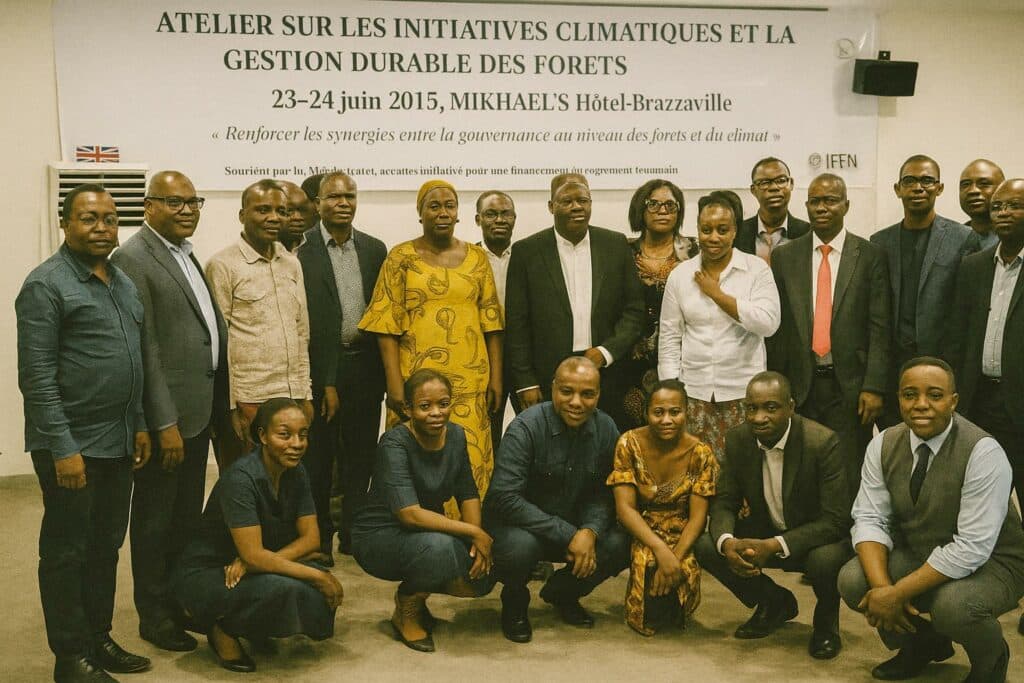Strategic Importance of the Congolese Forest Massif
The Republic of Congo sits at the heart of the Congo Basin, a biome second only to the Amazon in carbon sequestration potential. Recent estimates suggest that the country’s 22 million hectares of forest capture roughly 8 % of global tropical forest carbon stocks (World Bank 2024). In a decade increasingly defined by climate diplomacy, the stewardship of this natural capital has become a touchstone of Brazzaville’s foreign and economic policy. By hosting a national forum on sustainable forest management from 23 to 24 June 2025, Congolese authorities signalled that safeguarding timber reserves is no longer a purely environmental issue but a matter of strategic statecraft and revenue diversification.
Multi-Stakeholder Dynamics Meet Realpolitik
The recent forum, co-organised by the Rencontre pour la paix et les droits de l’homme and the Observatoire congolais des droits de l’homme, drew officials from the Ministries of Forest Economy, Finance and Interior, alongside concessionaires and representatives of Indigenous communities from Kouilou, Lékoumou and Sangha. Such a constellation of actors mirrors the logic behind Congo’s 2020 adhesion to the Central African Forest Initiative and its Letter of Intent with the European Union on Forest Law Enforcement, Governance and Trade. Christian Mounzéo’s call for “shared guardianship” resonated with concession holders eager for regulatory predictability, diplomats advocating climate finance flows, and village chiefs keen to secure customary rights.
Legal Architecture: Progress and Pending Decrees
Congo’s 2020 Forest Code, often praised by legal scholars for enshrining free, prior and informed consent, still awaits several implementing decrees. Participants urged the swift publication of those texts to allow contract renegotiations based on standardised social clauses proportionate to company size. Without such clarification, officials must rely on ministerial circulars that lack the force of law and expose investors to compliance uncertainty. The British-funded programme Forest Governance, Markets and Climate emphasised that legal opacity can depress timber exports by up to 12 % per annum, underscoring the economic stakes (FGMC brief 2023).
Community Inclusion as an Investment Safeguard
Indigenous delegates from Mokéko and Komono echoed peer-reviewed findings that participatory mapping reduces conflicts and doubles restoration success rates over a five-year horizon (CIFOR 2022). Laurence Wete Soh, the national facilitator for forest governance, argued that “decisions taken in daylight are less likely to be revisited in courtrooms”. Her remark aligns with recent jurisprudence from the Ouesso tribunal recognising community monitoring protocols as admissible evidence in illegal logging cases. For foreign investors seeking carbon credits or sustainable timber labels, the reputational premium attached to inclusive governance can be as decisive as stumpage fees.
Corporate Accountability and Market Access
Representatives of large concessionaires such as Industrie Forestière d’Afrique Centrale concurred that harmonised contractual obligations would facilitate certification under schemes like the Programme for the Endorsement of Forest Certification. In European markets tightening due-diligence rules, Congolese exporters need demonstrable compliance to avoid tariff setbacks. Forum participants proposed differentiated obligations calibrated to the scale of operations, a configuration already adopted in neighbouring Gabon. By endorsing that principle, companies implicitly acknowledged that robust regulation can be a passport rather than a barrier to market entry.
Geopolitical Signalling and Climate Finance
Brazzaville’s readiness to anchor sustainable forestry in national legislation carries resonance far beyond its borders. During last year’s Summit of the Three Basins in Libreville, President Denis Sassou Nguesso invoked the concept of ‘positive externalities’ to justify climate-linked debt swaps. The June forum adds granularity to that vision: clearly defined social clauses and strengthened civil-society monitoring provide donor agencies with measurable indicators. Diplomats interviewed at the event suggested that a fully operational Forest Code could unlock an additional 150 million USD in concessional finance by 2027, complementing revenues from liquefied natural gas and agribusiness corridors. In a region where fiscal buffers are thin, such green finance constitutes both a diplomatic lever and a hedging instrument against commodity volatility.

